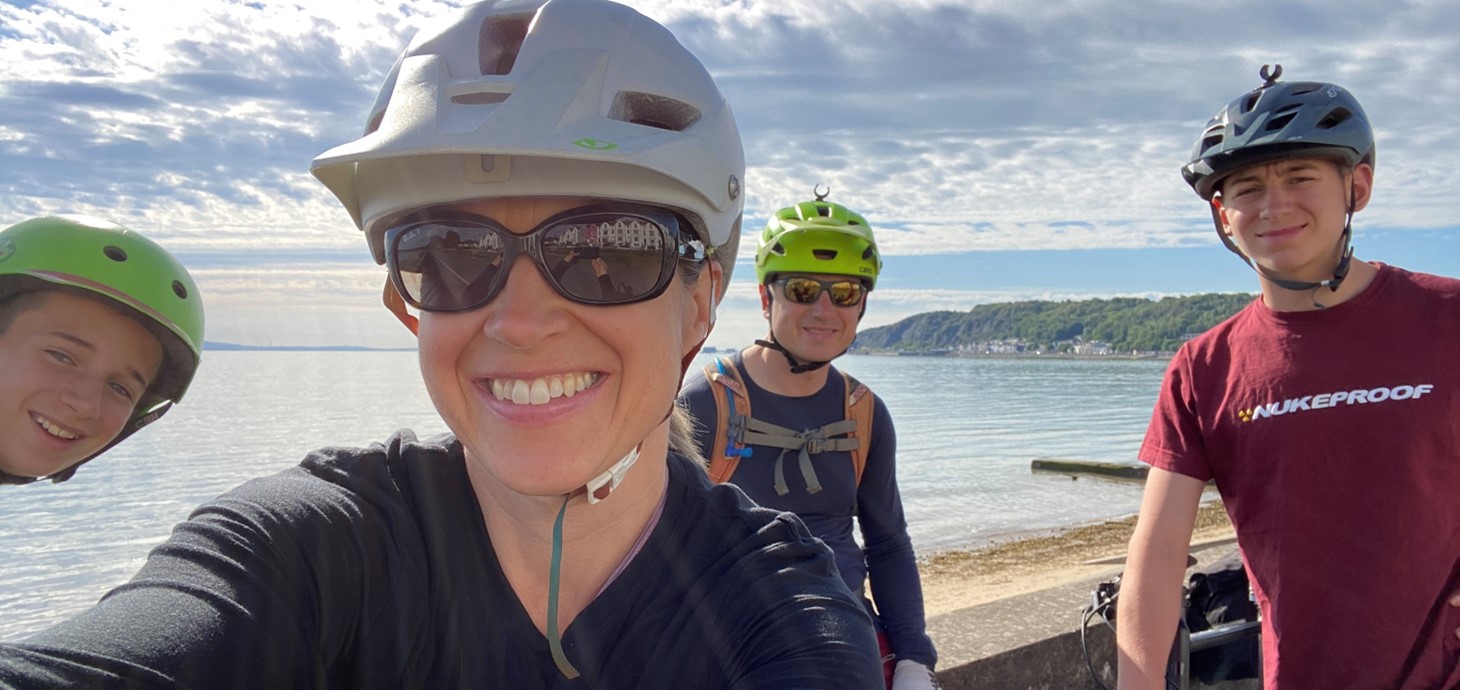
Julie Peconi with her family who helped inspire her research.
A researcher motivated by her son’s sunburn on a school sports day is encouraging primary schools across Wales to help develop sun safety guidelines for the spring and summer terms.
Dr Julie Peconi, from Swansea University, is leading a research project called Sunproofed which aims to understand how primary schools in Wales are responding to growing skin cancer rates and to explore the effectiveness of sun safety policies in schools on knowledge and behaviour. Sunproofed is funded by Health and Care Research Wales.
Julie, a volunteer with the skin charity, Skin Care Cymru, saw a need for her research after learning about the growing problem of skin cancer in Wales and seeing the increasing impact on dermatologists’ caseloads. This, combined with her son’s sports day sunburn, motivated her to develop the Sunproofed study.
“Despite the idea of Wales being a ‘rainy’ country, sunburn and skin cancer are growing problems,” she said.
“According to the Welsh Cancer Intelligence and Surveillance Unit, the crude rate of melanoma skin cancer increased by 96.7 per cent between 2002 and 2019. With serious sunburn in childhood greatly increasing the risk of skin cancer in later life, teaching school children about skin cancer prevention and how to enjoy the sun safely makes sense.
“Sunproofed is looking at primary schools in Wales and how they’re responding to these growing rates of skin cancer and how schools can help protect and educate children.
“We are asking all primary schools in Wales to take a short survey to help us understand whether schools have sun safety policies and what support schools need in this area.”
Once the data from the survey has been collected, the Research Team will compare it to anonymised routine health care data to see if there is a link between school policies and health care contacts for sun burns.
“After we have examined the data, and completed interviews with parents, teachers and children to identify any potential barriers to teaching sun safety in school, we will create a set of recommended guidelines of best practice for schools. Ultimately, the aim is for schools to help prevent sun damage to skin before it occurs,” said Julie.
Sunproofed is a collaborative study involving other Health and Care Research Wales organisations, with team members based in Swansea Trials Unit at Swansea University Medical School, SAIL Databank analysts and data scientists, and Cardiff and Vale University Health Board.
Dr Rachel Abbott, Consultant Dermatologist at Cardiff and Vale Hospital, is leading the clinical side of the study: “Children spend a great deal of time at school playing and learning outdoors, and one way to prevent skin cancer is to teach children at school how to protect themselves from the sun’s ultra-violet radiation.
“This study will champion prevention and teach the next generation about the dangers of overexposure and how they can enjoy the sun safely.”
Michael Bowdery, Head of Programmes at Health and Care Research Wales, said: “Preventing ill-health before it occurs is obviously better for all. A clear assessment of the current landscape in Wales in regard to sun safety policies in schools and producing evidenced-based guidance on best methods for implementation is so important in enabling Wales to move towards prevention of skin cancer, keeping people healthier for longer.”
All primary schools in Wales will have received a survey link and you can encourage your child’s primary school to take part in this research by asking them to respond or by emailing the study team. The survey is open until Friday, July 22
